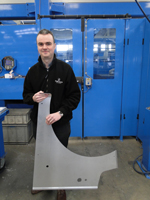15 July 2015
Prima Power LPe6f punch laser cell delivers flexible and automatic manufacture at Indicators International
 To enable it to offer high quality aluminium and stainless steel fabrications to its customers at competitive cost, Indicators International invested in a Prima Power LPe6f servo-electric punch/fibre laser combination cell, and a Finn Power E6 servo-electric punching cell.
To enable it to offer high quality aluminium and stainless steel fabrications to its customers at competitive cost, Indicators International invested in a Prima Power LPe6f servo-electric punch/fibre laser combination cell, and a Finn Power E6 servo-electric punching cell.
From its factory in Magherafelt, Northern Ireland, Indicators International produces kits of parts for a major bus manufacturer. These are shipped around the world to the bus company’s assembly facilities, enabling it to deliver buses not only in the UK, but as far away as Hong Kong. In addition, Indicators International works with architectural and construction companies producing items such as specialist fascias, petrol station canopies and passenger information systems.
Quality is extremely important as the majority of the panels it produces are visible aesthetic parts, such as the external panels for buses and the architectural features it manufactures. As well as ISO 9001, the company has to comply with the exacting quality standards of its customers, offering full component traceability and instilling a culture of high quality amongst its employees. Tom Diamond, Director at Indicators International says, “We process around 600 tons of material each year and, to achieve the right quality, we need to consider factors such as ripples in the sheet, material hardness, corrosion and static electricity. We have a lot of experience in this field and the automated handling on the Prima Power machines contributes significantly to maintaining high quality standards on thin materials which are easily marked.”
Indicators International uses Prima Power NC Express to programme the LPe6f and, as bus designs are frequently bespoke, it imports bills of material from the company’s MRP system, and DXF files from the customer for component geometry. Kits of parts are then nested across a number of sheets of material to optimise material utilisation. Sean O’Loughlin, Engineer at Indicators International says, “NC Express is very easy to use and it automatically takes account of the different handling systems on the LPe6f. Parts less than 500mm square go down the chute onto a conveyor which takes them outside the machine enclosure, while the robot arm picks off larger parts, sorting them into piles, ready for subsequent operations such as folding, assembly and welding.” The production queue set up by NC Express is sent to the LPe6f control unit, so the operator can see exactly what is being made. In addition, if there is an urgent change to the production requirements, the queue can be easily edited on the machine enabling the company to respond to last minute requests and, thanks to the flexible manufacturing possible on the machine, without undue disruption.
The servo-electric E6 punching cell replaced a hydraulic punching machine, which costs twice as much to run. The low power consumption of both the E6 and the LPe6f deliver important savings. To gain further energy savings, the company has installed a dedicated compressor to serve the two Prima Power machines, which means that the main factory compressor can be turned off when the machines are working out of hours. The E6 has a Compact Express material store enabling it to run unattended, tagging parts into the sheet. The machine is also ideal for louvered panels as these can be more difficult for robot unloading.
However, where possible, the company is moving more towards laser cutting and punching in one operation on the LPe6f. Tom Diamond says, “Edge quality is very important, and from trials it was clear that the fibre laser gave much better results. One of the roof panels we make has 1000’s of 3mm holes in it. We punch these using a 60 hole cluster tool. The profile is then laser cut and the finished part unloaded using the robot. The chutes for smaller parts are a big advantage as finished components are delivered into operator accessible bins while the machine is running. This enables parts to be labelled and sorted by the operator while the machine is cutting, greatly improving efficiency.”
Very few parts produced by Indicators International don’t go through the Prima Power machines, so reliability and after sales service are very important. Tom Diamond concluded, “The machine reliability is good and we get extremely fast response when parts need replacing. We can rely on Prima Power’s technical knowledge and ability and we would not be able to operate without the two machines.”
- Contact Information
- Name: Paul Downs
- Email: paul.downs@primapower.com
- Website: www.primapower.com

